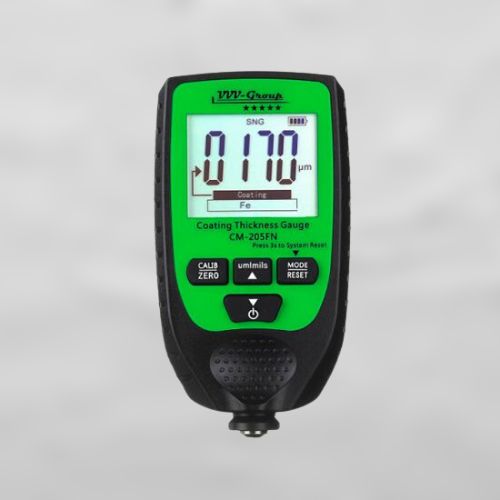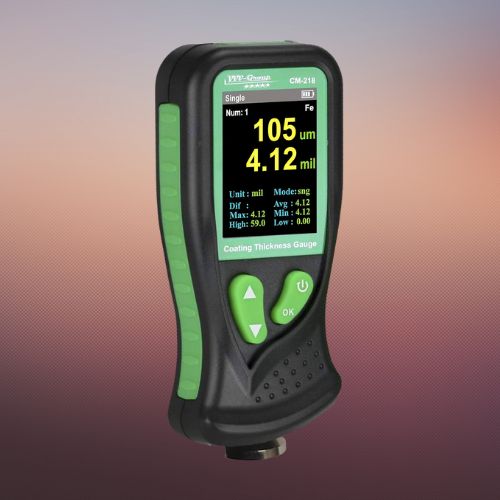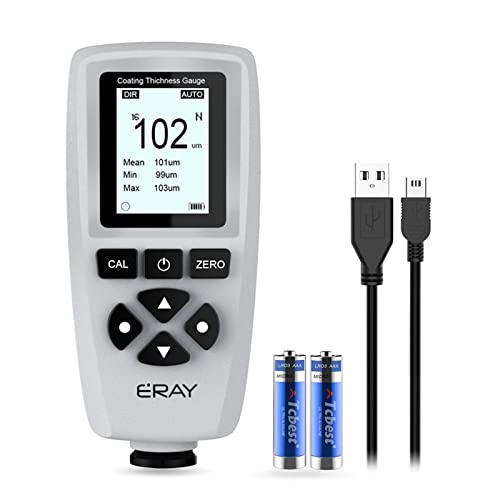6 Best Paint Thickness Gauges For Cars

When you decide to polish your car, you first need to find out the depth of the paint. Otherwise, you’re risking burning through a clear coat. That’s where paint thickness gauges come in. In this post, I’ll show you my top picks for paint thickness gauges, and most importantly, they’re all budget-friendly since I’ll keep the list under $150.
My Top Picks:
6 Best Car Paint Thickness Gauges Under $150
Finally, here’s my list of the six best car paint thickness gauges you can buy for less than $150, which is very affordable.
1. CM-205FN Coating Thickness Meter

The CM-205FN Coating Thickness Gauge is the best budget-friendly choice I’ve come across. It’s the first one I want to talk about because it delivers so much value for the price. It’s from a trusted name in the auto world, which just adds to its credibility.
Right out of the box, this gauge comes with everything: clear English instructions, a calibration set for the first-time setup, aluminum foils for practice, and a bag to keep it all together.
Despite its affordable price, it doesn’t look or feel cheap. It’s sleek, with a 2.2-inch backlit screen that’s a real eye-catcher, especially in low light.
Now, the sensor is the heart of the gauge. It has to be precise; otherwise, it’s no good. But this gauge? It’s accurate, and that gives me peace of mind that I’m not making costly mistakes based on bad data.
Just load it with AAA batteries, and it’s good to go. Measuring paint on any metal up to 1500µm thick. Honestly, for the money, the CM-205FN is impressive.
PROS
- Super High Accuracy
- Can work in all conditions
- It can work on a wide range of temperatures
- Ergonomic design
- It can work with ferrous and non-ferrous materials
- Battery status
- Sound helper
CONS
- No USB port to transfer data
2. ERAY Paint Coating Thickness Gauge

The ERAY Paint Coating Thickness Gauge stands out in the lineup for its advanced features. If budget isn’t a concern, I’d say it’s the best overall option available.
What sets it apart for me is the micro USB port. It’s a game-changer because it lets you transfer data straight to your computer. No more scribbling down numbers—just plug it in and review your measurements on a bigger screen.
The sensor’s sensitivity is another plus. It’s fine-tuned for precision, giving you confidence in the accuracy of your results. And the user interface? It’s a breeze to navigate. You can quickly select the material type and measurement unit—um, mm, or mils—making your job easier.
The ERAY P1 can measure paint thickness from 0 to 2000µm, covering a wide range. And when it arrives, it comes in a durable case that’s perfect for on-the-go jobs.
So, if you’re looking for top quality and the extra features are worth the investment to you, this gauge is the one to get.
PROS
- USB Data Transmission
- Easy to Carry
- Offers single and continuous measurements
- 3 Probe mode
- Fixed battery cover
CONS
- Only one color is available
3. Coating Thickness Gauge CM-206FN

The CM-206FN Coating Thickness Gauge really stands out with its black and green design. It’s refreshing to see something that breaks the mold of the usual look.
It runs on two AAA batteries, which is pretty convenient. The silicone housing is tough, which I appreciate because it can handle the knocks and bumps of daily use.
This device can measure from 0 to 53.2 mils or up to 1350 μm, which is a solid range for most tasks. Calibrating it is a breeze, at least that’s what I’ve heard from others, and I found it to be true in my use as well.
What really impresses me is its ability to measure even when the surface is wet—this isn’t something you come across often. Plus, it has a large memory built-in, so there’s no rush to clear out your data to make space for new measurements.
The one thing I wish it had is a USB port for transferring data directly to a computer. That would make it just about perfect.
PROS
- Weather resistance
- Tine and cost-saving
- Record high precision
CONS
- No USB port
4. CARSYS Coating Thickness Gauge DPM-816

The CARSYS DPM-816 Paint Thickness Gauge isn’t just another pretty tool; its sleek design is practical too. It’s small enough to take anywhere, and you can even clip it onto your work pants—super handy for when you’re on the move.
Just like the last gauge I mentioned, it’s not scared of a little weather—it can handle the cold and doesn’t mind getting wet in the rain.
One of the coolest features is the automatic detection. It figures out what kind of material you’re working with all on its own, which is a real time-saver.
Calibration is a snap—it takes just five seconds. And the sensor? It’s accurate to within 1% + 0.04 mils. That’s the kind of precision that can make a big difference in your work.
PROS
- Automatic detection
- Palm-size
- Works on wet surfaces
- 3 colors to choose from
CONS
- No USB port
5. Digital Coating Thickness Gauge CM218

The Digital Coating Thickness Gauge CM218 is the first on this list to boast a color screen. It’s a feature that might seem small, but in certain situations, those vivid colors could be a real benefit, making it easier to read measurements at a glance.
It has a decent measuring range, stretching from 0 to 1300μm or up to 51 mils, which should cover most tasks you throw at it.
One of my favorite features is the automatic shutdown. If you’re like me and sometimes forget to turn off your tools, this function is a battery-saver. The gauge will power down on its own after a period of inactivity.
Now, about the sensor accuracy—it’s stated as ± 3%. Honestly, I’ve worked with more precise gauges. While this might be fine for many applications, if you need pinpoint accuracy, this might not be the top choice.
The automatic material detection is a plus, though. It takes the guesswork out of setting up different coatings, which is a nice touch for efficiency.
PROS
- Simple calibration
- Large color display
- Works on wet surfaces
CONS
- Lower accuracy of the sensor
6. Wintact WT230 Coating Thickness Gauge

The Wintact WT230 Coating Thickness Gauge, which I’ve tried out, also sports a color screen. It seems like color displays are becoming more common, and other brands are definitely taking note.
What really sets this gauge apart is the rechargeable built-in battery. You won’t be fumbling for batteries; just connect it to a USB port, and it recharges, which is super convenient.
One of the coolest features is the voice announcement of measurements. It’s incredibly handy because it means you can keep your focus on your work without having to glance at the screen.
It also includes an automatic shut-off feature, which you can set based on how long the device has been idle, helping to preserve the battery life even further.
The measuring range is solid, going from 0 to 1300um or 51mil. And navigating the user interface is a breeze—it’s as intuitive as using a smartphone, which made it easy for me to get the hang of it quickly.
PROS
- Built-in battery
- Color display
- Friendly user interface
CONS
- Higher price
Paint Thickness Gauge Buying Guide
When buying a paint thickness gauge, several essential factors must be considered. Here are some key points to keep in mind.
Measurement Range
- Check the measurement range of the paint thickness gauge. Ensure that it covers the paint thickness range you will likely encounter in your specific application. Different gauges have varying ranges, so select one that suits your needs.
Accuracy
- Accuracy is crucial for obtaining precise and reliable measurements. Look for a paint thickness gauge with a high level of accuracy, preferably within ±1-3% of the actual thickness.
Resolution
- Resolution refers to the smallest incremental change the gauge can detect. A higher resolution enables you to detect even small variations in paint thickness. Consider a gauge with a finer resolution for more detailed measurements.
Type of Coating
- Determine the type of coating you will be measuring. Some paint thickness gauges are designed specifically for non-magnetic coatings (e.g., paint, plastic), while others are suitable for non-magnetic and magnetic coatings (e.g., paint on steel). Choose a gauge that aligns with your coating types.
Probe Size
- Consider the size of the probe on the paint thickness gauge. If you work on small or intricate surfaces, a smaller probe size will be more convenient and allow better access. However, larger probes may be necessary for larger areas.
Display and Interface
- Look for a gauge with a clear and easy-to-read display. The interface should be user-friendly and provide essential information such as measurement units, statistics, and calibration data. Some gauges may have additional features like data logging or connectivity options for transferring measurements to a computer or smartphone.
Calibration
- Calibration is essential to ensure accurate measurements over time. Check if the paint thickness gauge requires regular calibration and if it provides a calibration procedure or options for calibration adjustment.
Durability and Build Quality
- Consider the gauge’s durability and build quality, especially if you anticipate frequent or demanding use. Look for a rugged and reliable device that can withstand the conditions of your work environment.
Power Source
- Determine the power source of the gauge. Some models operate on replaceable batteries, while others have built-in rechargeable batteries. Choose the one that suits your preference and the availability of power sources.
Price and Brand Reputation
- Compare prices from different manufacturers and consider the reputation of the brand. Look for reliable and reputable brands that offer good customer support and warranty options.
Remember to assess your specific requirements and consider the intended application of the paint thickness gauge. Considering these factors, you can make an informed decision and select a gauge that best suits your needs.
Frequently Asked Questions
Paint thickness gauges typically have an accuracy of ±1-3% of the actual thickness. Check the model’s specifications for exact details.
Most paint thickness gauges are compatible with a range of automotive coatings, including both magnetic and non-magnetic types, and can measure paint, clear coats, and primers.
Paint thickness gauges are designed to work on curved or contoured surfaces with probes that adapt to irregular shapes for accurate measurements.
Paint thickness gauges need periodic calibration for accuracy, especially when switching between different surfaces or coatings. Instructions are usually included with the model.
Certain paint thickness gauges can store data for future reference and may allow transfer to digital devices, but this varies by model, so verify the specific gauge’s specifications.
Conclusion
I hope this guide has illuminated the path to finding the perfect paint thickness gauge for your needs. While my personal favorite remains the CM-205FN for its blend of value and performance, rest assured that any pick from this list should meet your expectations with flying colors.
Remember, the right tool not only adds precision to your work but also protects your vehicle from potential damage during maintenance—like the dreaded over-polishing scenario.
- Are you curious about achieving that flawless finish on your car? Dive into my comprehensive guide on car polishing.
- And if you’re in search of the ultimate polisher to complement your new gauge, don’t miss my curated list of the best car polishers on the market.


